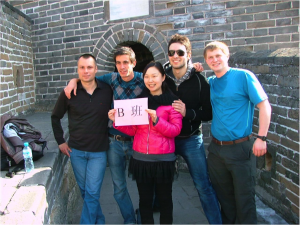Story written by Henry Clock, IPD, ’16
 I spent 2012 learning Arabic and Chinese in immersive learning experiences in Morocco, Shanghai and Cairo. Study abroad experiences made both languages come alive but it was difficult to keep up my skills in one language while studying and living in the other.
I spent 2012 learning Arabic and Chinese in immersive learning experiences in Morocco, Shanghai and Cairo. Study abroad experiences made both languages come alive but it was difficult to keep up my skills in one language while studying and living in the other.
I found ways to continue my learning and had an enriching experience that propelled me to success at the Institute, where I was able to further my language learning and get to higher levels in both Arabic and Chinese.
 2012 was a whirlwind year for me, unlike any other. After finishing my Junior year at Vanderbilt University, I went to Morocco for a month-long “Maymester”. That summer, I studied Chinese at Donghua University in Shanghai. And in the fall, I studied Arabic at the American University of Cairo. My language skills improved greatly that year, though I found it difficult to retain some of the vocabulary and grammar points that I learned while studying the other language. My Arabic skills did subside a bit while I was in Shanghai. Likewise, my Chinese skills subsided while I was in Cairo.
2012 was a whirlwind year for me, unlike any other. After finishing my Junior year at Vanderbilt University, I went to Morocco for a month-long “Maymester”. That summer, I studied Chinese at Donghua University in Shanghai. And in the fall, I studied Arabic at the American University of Cairo. My language skills improved greatly that year, though I found it difficult to retain some of the vocabulary and grammar points that I learned while studying the other language. My Arabic skills did subside a bit while I was in Shanghai. Likewise, my Chinese skills subsided while I was in Cairo.

My passion for Chinese truly began after my first study abroad in Beijing at the Beijing Language and Culture University. It was a true cultural immersion experience for me: my Mandarin was not very good and I was diving into an environment where English was not very well understood or spoken by most Chinese. Like many students who study abroad, though, I found that my Chinese quickly improved as I focused on the language five days a week for six hours a day inside the classroom and countless hours outside of class, doing homework, ordering food, meeting Chinese friends, getting directions on the street, and all the other ins and outs of studying abroad.
Thus, the question of course becomes: how to retain advanced language skills in a difficult language while immersed in a different difficult language? In my case,  I found that reading the news, listening to music and reviewing old essays in the
I found that reading the news, listening to music and reviewing old essays in the
language can help delay losing language skills. Eventually, some skills will be lost until you can find a way to reignite them.
At MIIS, I had the opportunity to learn both Arabic and Chinese simultaneously, while also taking classes on International Trade. I find that in both languages, the professors consistently challenge the students to push their skills to the next level. The first few classes can be intimidating for students: do I really understand what the professor just asked me? Can I respond in a way that I don’t mess up grammatically? Am I making sense? Do I sound fluent in my pronunciation, vocabulary usage and the content of my sentences? This is difficult in written language, much less when speaking to a native speaker who is evaluating every word, every sound and every pause.
Nonetheless, I’ve made incredible progress. If I compare the kinds of writing I can do today in Arabic or Chinese with what I was capable of in undergraduate, it’s quite obvious that I’ve come a long way. During my last semester at the Institute, I gave a presentation in Chinese on China’s Rare Earth Elements trade with the rest of the world. That would have been inconceivable for me just two years prior.

